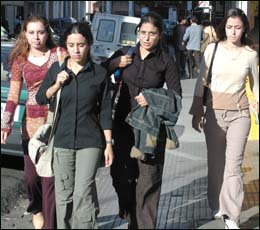 Modern Moroccan women may feel empowered by the Family Code, but their poorer sisters and mothers are yet to feel the impact of the progressive changes the code enshrines.
Modern Moroccan women may feel empowered by the Family Code, but their poorer sisters and mothers are yet to feel the impact of the progressive changes the code enshrines.A recent study has shown that 91% of illiterate women in Morocco have no information about the provisions of the new Family Code. The study, conducted by Kamal Mellakh, a sociology professor in Mohammedia's Hassan II University, also revealed that among illiterate men, 80% totally lacked any information about the Code.
According to the investigation, this lack of information is due to considerable gaps at the level of communication and awareness raising concerning the new legislation, may give way to the spread of wrong information.
The Family Code, or Mudawana, was unanimously adopted by the Parliament's House of Advisors on Jan. 23, 2004, after it had been earlier adopted by the House of Representatives.
Before it was reformed, the previous Family Code gave control over the family to the man and stipulated that the woman's main duty was to obey her husband.
In March 1999, former State Secretary for Family Affairs, Saïd Saidi, introduced a bill known as the “National Action Plan for Integrating Women in Development.” This bill aimed at asserting some basic rights for women against discrimination and abuse.
The new Family Code came to establish equality between men and women, on the basis of the teachings of Islam.
The new code has been one of the key reforms of the Moroccan King. Indeed, in one of his first speeches after coming to power, King Mohamed VI stressed the need to improve the situation of Moroccan women, who constitute half of society and whose "interests are still denied" The subjugation of women there, though limited by law and constitution, is rampant, ranging from wage discrimination to physical abuse to under-representation in administrative and political bodies. For decades, women were legally defined as dependent on men. Emboldened by the king's support, women and human rights organizations have long pushed for reforms, demanding equal rights in marriage, challenging a host of religiously sanctioned practices--from polygamy to repudiation--and requiring changes in core legislation that are blatantly discriminatory toward women and that lie at the root of women's subordination in Moroccan society.
Nadia Yassine, of the Association of Justice and Spirituality is perhaps Morocco's best known Muslim leaders and she participated in the street demonstrations against changes to the family code in 2000 because she says, the proposals at the time were un-Islamic and the result of foreign influence.
Now a backer of the King's Mudawana, Nadia Yassine says it does not go far enough because women remain minors under the penal code, which has not changed.
With the adoption of the new Mudawana, Morocco is set to become one of the most progressive countries in terms of women's rights in the Arab world.. if they can get the message of the code out to the women who need it most.
Tags: Morocco, Fès, Maghreb, news

No comments:
Post a Comment